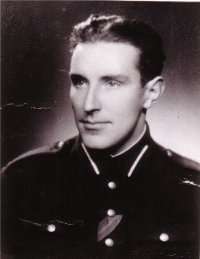Kārlis Mūsiņš
| Kārlis Mūsiņš | |
|---|---|
|
Kārlis Mūsiņš in 1942 wearing uniform of the Latvian army. (Most of the latvian Schuma/Police battalion personnel was dressed in pre war latvian army uniforms). | |
| Born |
15 December 1919 Dzērbene parish, Latvia |
| Died |
2 June 1955 (aged 35) Moscow, Soviet Union |
| Allegiance |
|
| Service/branch |
|
| Years of service | 1941–1945 |
| Rank | Untersturmführer |
| Unit |
19th Waffen Grenadier Division of the SS (2nd Latvian) Latvian national partisans |
| Battles/wars | World War II |
| Awards |
Iron Cross I Class Iron Cross II Class Eastern Front Medal German Cross (in Gold) |
Kārlis Mūsiņš (15 December 1919 – 2 June 1955) was a Untersturmführer in the Waffen SS during World War II and Latvian National partisan after the war. He was awarded with the German Cross in gold.[1]
Biography
Kārlis Mūsiņš was born on 15 December 1919 in the Dzērbene parish, Latvia as the son of a blacksmith. After his basic education, he went to Riga where he worked in the VEF factory. He served in the Latvian army.
In the autumn of 1941, Mūsiņš joined the 16th Zemgale Latvian Police Battalion and was sent to the eastern front. There the battalion was involved in anti-partisan duties and also as a combat unit on the Leningrad front.[2] In 1943, the Latvian Legion was formed and the 16th Zemgale battalion became part of the 2nd Latvian SS Infantry Brigade and was fighting on the Volchov front.[3] In the spring of 1944, the Latvian brigade was transformed into 19th Waffen Grenadier Division of the SS and Mūsiņš became a company commander. He fought in all the major battles from the summer of 1943 up to the Courland Pocket and the German surrender in May 1945. He was awarded with the Eastern Front Medal, the Iron Cross (I and II class) and the German Cross in gold.
After German capitulation, Mūsiņš did not surrender. With some comrades, he went to the Northern Vidzeme and joined the armed resistance movement Forest Brothers. Until 1953, he commanded a partisan unit and was involved in many skirmishes with NKVD troops. In September 1953, his unit was betrayed and Mūsiņš was arrested by the NKVD. He was condemned to death and shot in the Butirki prison, Moscow on 2 June 1955.
References
- ↑ http://www.axishistory.com/index.php?id=898
- ↑ A. Silgailis “Latviešu leģions”, Rīga, 2006., p.284
- ↑ 16. Zemgales Kārtības dienesta bataljona kaujas darbība Ļeņingradas frontes aizmugures apstākļos.
